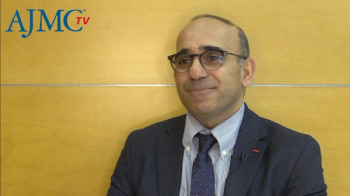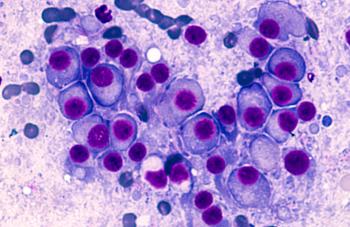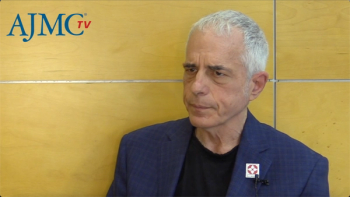
Suzanne Lentzsch, MD, PhD, of Columbia University, presented promising results of linvoseltamab for treating relapsed/refractory multiple myeloma (RRMM) at the European Hematology Association 2024 Congress.

Suzanne Lentzsch, MD, PhD, of Columbia University, presented promising results of linvoseltamab for treating relapsed/refractory multiple myeloma (RRMM) at the European Hematology Association 2024 Congress.

Enthusiasm abounded at the recent European Hematology Association 2024 Congress about whether European regulators will begin to consider minimal residual disease (MRD) as an end point.

A poster presented at the 2024 American Society of Clinical Oncology annual meeting argued the benefits that Medicaid expansion can bring to patients with melanoma.

Interview on Ontada research presented at ISPOR 2024.

Interview on Ontada research presented at ISPOR 2024.

Interview on Ontada research presented at ISPOR 2024.

Interview on Ontada research presented at ISPOR 2024.

Ana Lacerda, MD, MSc, of the Portuguese Institute of Oncology, advocates for early palliative care integration in pediatric patients with hematologic diseases.

The late-breaking oral session at the European Hematology Association (EHA) 2024 Congress featured new data from abstracts submitted after the deadline, including both interventional and foundational science.

Mohamad Mohty, MD, PhD, of Saint-Antoine Hospital and Sorbonne University, highlights how immunotherapies are offering various effective treatment options for patients with multiple myeloma and improving quality of life for relapsed/refractory patients.

Joseph Mikhael, MD, MEd, FRCPC, FACP, of the International Myeloma Foundation, HonorHealth, and TGen, notes that US physicians have more flexibility when treating patients with early relapsed/refractory multiple myeloma, whereas those in Europe must follow stricter protocols.

At a session of the European Hematology Association 2024 Congress, presenters shared updates from trials of treatment strategies for newly diagnosed multiple myeloma (MM).

Jennifer Vidrine, MBBS, MRCP, of Newcastle upon Tyne Hospitals, stresses the importance of providing personalized, beneficial end-of-life care for patients with hematologic diseases.

At a friendly debate held at the European Hematology Association 2024 Congress, hemophilia experts argued for and against wider access to gene therapy for patients living with the condition.

Ryan Jacobs, MD, of Atrium Health Levine Cancer Institute, explains that the phase 2 CAPTIVATE study's fixed-duration treatment cohort shows long-term progression-free survival for patients with chronic lymphocytic leukemia (CLL) who received the first-line treatment of ibrutinib and venetoclax.

This investigation used data from The US Oncology Network on trends in lung cancer stage when patients present for care.

The results of the 3-year follow-up show meaningful improvement in overall survival (OS) and progression-free survival (PFS) for tislelizumab plus chemotherapy compared with placebo plus chemotherapy.

Abstracts presented at the 2024 European Hematology Association Congress deliver results on regimens involving venetoclax for chronic lymphocytic leukemia (CLL).

Results presented at the 2024 European Hematology Association Congress suggest that chimeric antigen receptor (CAR) T-cell therapy can be feasibly and safely delivered in the outpatient setting as treatment for lymphoma.

Brian Koffman, MDCM, DCFP, FCFP, DABFP, MSEd, of CLL Society, details the comprehensive multidisciplinary support for patients with chronic lymphocytic leukemia (CLL) at the European Hematology Association (EHA) 2024 Congress.

Marta Rodríguez Martínez, PhD, sustainability officer of the European Molecular Biology Laboratory, highlights the primary sources of scientific research waste and how to reduce them.

At a YoungEHA session at the 2024 European Hematology Association (EHA) Congress, speakers discussed the prevalence of waste in laboratories, research, and clinical practice, as well as ways attendees can effect change for a more sustainable future.

John Hood, PhD, cofounder and CEO of Endeavor BioMedicines, explains the potential advantages of ENV-101 during a time with very few treatments for idiopathic pulmonary fibrosis (IPF).

One patient died during this study, which used PET/CT, flow cytometry, and next-generation sequencing to define measurable residual disease negativity.

The SLEEP 2024 Annual Meeting featured talks on numerous topics throughout the 5-day meeting, including sleep inequities, narcolepsy, and mental health’s association with sleep.

The TRITON study is evaluating tremelimumab/durvalumab/chemotherapy vs pembrolizumab/chemotherapy in non–small lung cancer (NSCLC) with STK11 and/or KEAP1 and/or KRAS mutations.

During the CMS Health Equity Conference, health care leaders shared groundbreaking strategies to integrate health equity into value-based care models, aiming to enhance patient outcomes and reduce costs.

The global burden of liver cancer is rising, and public health efforts for prevention, vaccination, and treatment to address underlying etiologies are needed, according to research presented at ASCO 2024.

Findings from ASCO 2024 suggest deruxtecan (T-DXd) may become a preferred first-line treatment for patients with hormone receptor (HR)-positive, HER2-low metastatic breast cancer that progressed after endocrine therapy.

Experts share what they are looking forward to most at this year's European Hematology Association (EHA) Congress.

259 Prospect Plains Rd, Bldg H
Cranbury, NJ 08512
© 2025 MJH Life Sciences®
All rights reserved.
